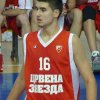Predrag Stojakovic was born June 9, 1977 in Slavonska Pozega, Yugoslavia.
He is currently the director of player personal for the Sacramento Kings and the General Manager of the Reno Bighorns.
Stojakovic spent most of his career in the NBA. At 6'9'' he played small forward. He won the NBA Three points shootout two times, was the first European (Serbian-Greek) player to win one of the All Star Weekend Competitions.
Stojakovic made 1,760 three point field goals in his career which ranked 10th all time at the point of his retirement.
Stojakovic played for Crvena zvezda in Yugoslavia and PAOK in Greece, and for in NBA the Kings, Pacers, Hornets, Raptors and Mavericks.
He has won both Gold and Bronze Medals at the FIBA Eurobasket and has been an MVP at this event.
He also participated in the 2000 Olympics.






